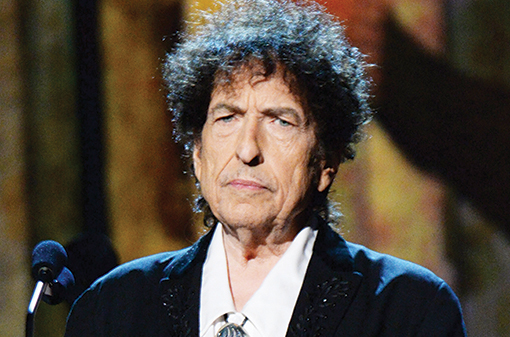(RNS) You could not have asked for better timing.
As the gates of Yom Kippur were closing, we learned that Bob Dylan, the single most iconic singer-songwriter of the past half-century, had just won the Nobel Prize in Literature.
This is great news, on several levels.
First, it single-handedly affirms the literary worthiness of rock music. For decades, we (and cool high school English teachers) have known that many singer-songwriters have been creating miniature works of literature.
Somewhere, in a moving box, is my copy of Richard Goldstein’s The Poetry of Rock, which features works by Dylan, Paul Simon, Leonard Cohen, John Lennon and Paul McCartney, among others. We knew it then — rock lyrics could be poetry. And now, the Nobel Committee has made sure that the world knows it, as well.
Second, it is a noteworthy piece of Jewish news. Dylan is now the 15th Jew to win the Nobel Prize in Literature. He joins such luminaries as Boris Pasternak, S.Y. Agnon, Nelly Sachs (who shared the prize in 1966), Saul Bellow, Isaac Bashevis Singer and Nadine Gordimer.
Yes, some would say, in Brooklynese, that Philip Roth “wuz robbed,” and that he should have won a Nobel. I hope that he still will win one.
Dylan’s work incorporates, reflects and even illustrates the Jewish experience in the world. True: It has not always been the case. For a while, Dylan was a born-again Christian, and those themes appeared in his music.
Check out his album “Slow Train Coming” — with crosses on the cover, and crosses in the music.
At times, he sounds like Paul — and I am not talking McCartney.
Here is my list of “Bob Dylan’s Greatest Jewish Hits”:
- “Highway 61” reworks the Akedah, the story in Genesis about how God commanded Abraham to sacrifice his son, Isaac, which gets “theological prime time” on Rosh Hashanah.
- “Gates of Eden.” Ever since Adam and Eve were expelled from the Garden of Eden, we have been living in an unredeemed world.
- “When The Ship Comes In.” History has a purpose. It leads to an ultimate redemption — with a biblical reference to the drowning of Pharaoh’s army.
- “Father of Night.” It is a hymn to God, deeply Jewish in its theological content — a close cousin, liturgically, to “Adon Olam” (or “Master of the Universe,” a central liturgical hymn).
- “Man Gave Names to All the Animals.” A rereading of the Genesis text, in which God gives Adam the task of naming the animals, which forever enshrines humanity as the meaning-making, category-creating being.
- “Neighborhood Bully.” A barely disguised love song to the state of Israel, doing what it must do to survive in a hostile neighborhood. And still, she is called the “neighborhood bully.” One of the greatest affirmations of a Jewish idea that has ever appeared in popular musical culture.
- “Forever Young.” A beautiful blessing, with biblical overtones (“May you build a ladder to the stars, and climb on every rung”). I have used this song as a blessing for bar and bat mitzvah kids — as well as for octogenarians (and older) who are celebrating their birthdays.
- “Everything Is Broken.” Judaism is the story of brokenness. Think: Abraham’s childhood idols; the tablets of the Commandments; the broken glass at Jewish weddings; the windows of shops, homes and synagogues of Kristallnacht — and, according to Jewish mysticism, existence itself.
Dylan’s true Jewish musical heir is his son-in-law, Peter Himmelman. He is an observant Jew, and his music is infused with Jewish themes. He is also an author; check out his new book on the meaning of creativity.
The real story here is Dylan’s early career.
“Talkin’ Hava Nageilah [sic] Blues” (1962). This was 1962 — still years before American Jews were comfortable with overt ethnic consciousness. And yet, here is this 21-year-old kid from Hibbing, Minn., singing “Jewish.”
But this pales in significance to:
“With God on Our Side.” This was on Dylan’s 1964 album, “The Times They Are A-Changin’.”
Consider this verse.
When the Second World War
Came to an end
We forgave the Germans
And we were friends
Though they murdered six million
In the ovens they fried
The Germans now too
Have God on their side.
Today, American culture is filled with Holocaust references.
But “With God on Our Side” came out in 1964.
As Deborah Lipstadt points out in her new book on the Holocaust and American consciousness, American culture had not yet become comfortable talking about the Holocaust.
“With God on Our Side” was, therefore, one of the earliest references to the Holocaust in American popular culture.
And, though it did not mention “Jews,” it did mention the 6 million, as well as a grisly reference to the disposal of the bodies.
Dylan was one of the first figures in American culture to mention the Holocaust.
In so doing, he actually helped American Judaism find its voice.
So, mazel tov, Bob.
You have earned this great honor.
And if you are hesitant about this, and wonder if you really deserve it:
“Don’t Think Twice, It’s All Right.”
(Rabbi Jeffrey K. Salkin is the spiritual leader of Temple Solel in Hollywood, Fla., and the author of the Martini Judaism column at RNS)






